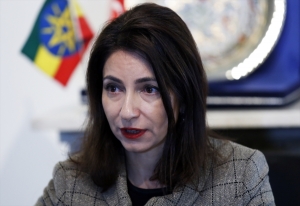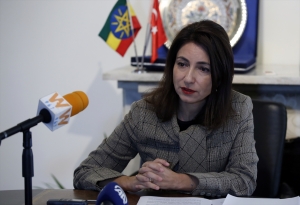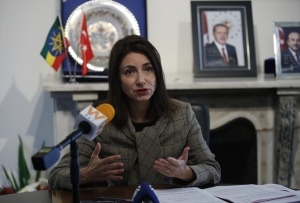Büyükelçi Yaprak Alp Etiyopya'ya Barış Pınarı Harekatı'nı anlattı

Türkiye'nin Addis Ababa Büyükelçisi Yaprak Alp, Etiyopya'daki basın mensuplarına Barış Pınarı Harekatı'nın gerekçelerini anlattı.
Alp, başkent Addis Ababa'da Etiyopyalı basın mensuplarıyla bir araya geldiği toplantıda, Türkiye'nin birçok sebeple bu operasyonu başlatmak zorunda kaldığını ifade etti.Türkiye'nin teröre ve DEAŞ'a karşı başlatılan mücadelede kararlılığını sürdürdüğünü hatırlatan Alp, terör örgütü YPG/PKK'nın sürekli sınır hattından Türkiye'yi hedef alan saldırılar düzenlediğine dikkati çekti.
Büyükelçi Alp, YPG'nin bölgede artan insan hakları ihlallerine de vurgu yaparak, terör örgütünün çocukları zorla silah altına aldığını, muhalifleri tehdit ettiğini ve demografik yapıyı değiştirmeye çalıştığını belirtti.Alp, "Bu şartlar altında, sınırlarımızdaki terör varlığını daha fazla tolere edemezdik. Uluslararası kamuoyunun hareketsiz kaldığı yerde, Türkiye harekete geçmek zorundaydı." dedi.Türkiye'nin güney sınırında oluşturulmaya çalışılan terör koridorunu yok etmek, bölgeye barış ve huzur getirmek amacıyla Türk Silahlı Kuvvetlerince (TSK) başlatılan Barış Pınarı Harekatı 9 Ekim'den bu yana devam ediyor.
Ethiopia: Envoy explains Turkey's anti-terror push
'Where international community failed to act, Turkey had to take action,' says Turkish ambassador to Ethiopia.Turkey's ambassador to Ethiopia and envoy to the African Union said on Thursday that Turkey had four compelling reasons to launch its current anti-terror operation in northern Syria.Speaking to local journalists in Ethiopia, Yaprak Alp publicly explained the justifications of the Turkey-led operation."First, our resolve to fight against terrorist organizations is firm. In Syria, we are a committed member of the Global Coalition against Daesh. However, the threat of terrorism from Syria and targeting our borders is not limited to Daesh,"Second, the threat of terrorism originating from Syria and targeting our borders has not yet ended. During the last two years, the PYD/YPG, the Syrian offshoot of the PKK terrorist organization, has perpetrated more than 300 terrorist attacks targeting Turkey or Syrians within Syria," she said.
Turkey shares a long border with Syria, she said, adding that Turkey hosted more than four million Syrian refugees.The third reason, she said, was that "explosives and ammunition have been smuggled to Turkey to be handed over to the PKK terrorist organization.""Fourth, there has been growing evidence about the PYD/YPG’s human rights violations such as recruiting child soldiers, intimidating dissidents, demographic engineering and forced conscription in areas under its control," she added.
Alp underlined that Turkey had consulted with all its allies including with the U.S. on the establishment of a safe zone to address Ankara's legitimate security concerns and sustain the fight against Daesh which had remained inconclusive.She stressed that under the current circumstances, Turkey could no longer tolerate "the presence of terrorists" at its borders and was thus compelled to act."Where the international community failed to act, Turkey had to take action," she said.Turkey on Oct. 9 launched Operation Peace Spring to eliminate terrorists from northern Syria in order to secure Turkey’s borders, aid in the safe return of Syrian refugees and ensure Syria’s territorial integrity.Ankara wants to clear northern Syria east of the Euphrates River of the terrorist PKK and its Syrian offshoot, the YPG.In its more than 30-year terror campaign against Turkey, the PKK -- listed as a terrorist organization by Turkey, the U.S. and the European Union -- has been responsible for deaths of 40,000 people, including women, children and infants.




